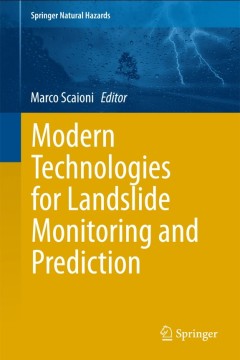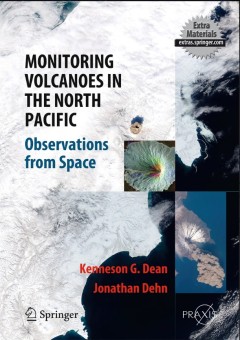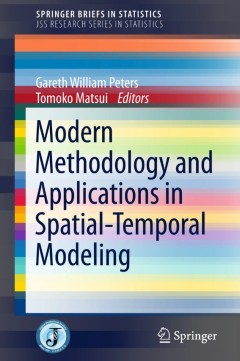Filter by

Modern Technologies for Landslide Monitoring and Prediction
Modern Technologies for Landslide Investigation and Prediction presents eleven contributed chapters from Chinese and Italian authors, as a follow-up of a bilateral workshop held in Shanghai on September 2013. Chapters are organized in three main parts: ground-based monitoring techniques (photogrammetry, terrestrial laser scanning, ground-based InSAR, infrared thermography, and GNSS networks), g…
- Edition
- 1
- ISBN/ISSN
- 978-3-662-45930-0
- Collation
- XII, 249
- Series Title
- Springer Natural Hazards
- Call Number
- -

Emerging Research in Computing, Information, Communication and Applications …
This proceedings volume covers the proceedings of ERCICA 2015. ERCICA provides an interdisciplinary forum for researchers, professional engineers and scientists, educators, and technologists to discuss, debate and promote research and technology in the upcoming areas of Computing, Information, Communication and their Applications. The contents of this book cover emerging research areas in field…
- Edition
- -
- ISBN/ISSN
- 978-981-10-0287-8
- Collation
- 111 b/w illustrations, 269 illustrations in colour
- Series Title
- -
- Call Number
- -

Emerging Research in Computing, Information, Communication and Applications …
This proceedings volume covers the proceedings of ERCICA 2015. ERCICA provides an interdisciplinary forum for researchers, professional engineers and scientists, educators, and technologists to discuss, debate and promote research and technology in the upcoming areas of Computing, Information, Communication and their Applications. The contents of this book cover emerging research areas in field…
- Edition
- -
- ISBN/ISSN
- 978-81-322-2553-9
- Collation
- 109 b/w illustrations, 257 illustrations in colour
- Series Title
- -
- Call Number
- -

Monitoring Volcanoes in the North Pacific:Observations from Space
This book provides a unique visual experience, showing satellite images of volcanic eruptions worldwide and detailed observations from the North Pacific ‘ring of fire’. Daily volcano monitoring and analysis from this region have resulted in one of the most detailed collections of satellite images in the world. An international team of experts has provided comprehensive cov…
- Edition
- 1
- ISBN/ISSN
- 978-3-540-24125-6
- Collation
- XXXIII, 363
- Series Title
- Springer Praxis Books
- Call Number
- -

Emerging Research in Computing, Information, Communication and Applications …
This proceedings volume covers the proceedings of ERCICA 2015. ERCICA provides an interdisciplinary forum for researchers, professional engineers and scientists, educators, and technologists to discuss, debate and promote research and technology in the upcoming areas of Computing, Information, Communication and their Applications. The contents of this book cover emerging research areas in field…
- Edition
- -
- ISBN/ISSN
- 978-81-322-2550-8
- Collation
- 87 b/w illustrations, 218 illustrations in colour
- Series Title
- -
- Call Number
- -

Molecular Modeling and Multiscaling Issues for Electronic Material Applications
This book offers readers a snapshot of the progression of molecular modeling in the electronics industry and how molecular modeling is currently being used to understand materials to solve relevant issues in this field. The reader is introduced to the evolving role of molecular modeling, especially seen from the perspective of the IEEE community and modeling in electronics. This book also cover…
- Edition
- 1
- ISBN/ISSN
- 978-3-319-12861-0
- Collation
- X, 194
- Series Title
- -
- Call Number
- -

Modern Methodology and Applications in Spatial-Temporal Modeling
This book provides a modern introductory tutorial on specialized methodological and applied aspects of spatial and temporal modeling. The areas covered involve a range of topics which reflect the diversity of this domain of research across a number of quantitative disciplines. For instance, the first chapter deals with non-parametric Bayesian inference via a recently developed framework known a…
- Edition
- 1
- ISBN/ISSN
- 978-4-431-55338-0
- Collation
- XV, 111
- Series Title
- SpringerBriefs in Statistics
- Call Number
- -

Molecular Dynamics Simulations of Disordered Materials
This book is a unique reference work in the area of atomic-scale simulation of glasses. For the first time, a highly selected panel of about 20 researchers provides, in a single book, their views, methodologies and applications on the use of molecular dynamics as a tool to describe glassy materials. The book covers a wide range of systems covering "traditional" network glasses, such as chalcoge…
- Edition
- 1
- ISBN/ISSN
- 978-3-319-15674-3
- Collation
- XIX, 529
- Series Title
- Springer Series in Materials Science
- Call Number
- -

The Solar Activity Cycle Physical Causes and Consequences
A collection of papers edited by four experts in the field, this book sets out to describe the way solar activity is manifested in observations of the solar interior, the photosphere, the chromosphere, the corona and the heliosphere. The 11-year solar activity cycle, more generally known as the sunspot cycle, is a fundamental property of the Sun. This phenomenon is the generation and evolution …
- Edition
- -
- ISBN/ISSN
- 978-1-4939-2584-1
- Collation
- -
- Series Title
- -
- Call Number
- -

The Soils of Taiwan
Physical Geography
- Edition
- -
- ISBN/ISSN
- 978-94-017-9726-9
- Collation
- -
- Series Title
- -
- Call Number
- -
 Computer Science, Information & General Works
Computer Science, Information & General Works  Philosophy & Psychology
Philosophy & Psychology  Religion
Religion  Social Sciences
Social Sciences  Language
Language  Pure Science
Pure Science  Applied Sciences
Applied Sciences  Art & Recreation
Art & Recreation  Literature
Literature  History & Geography
History & Geography